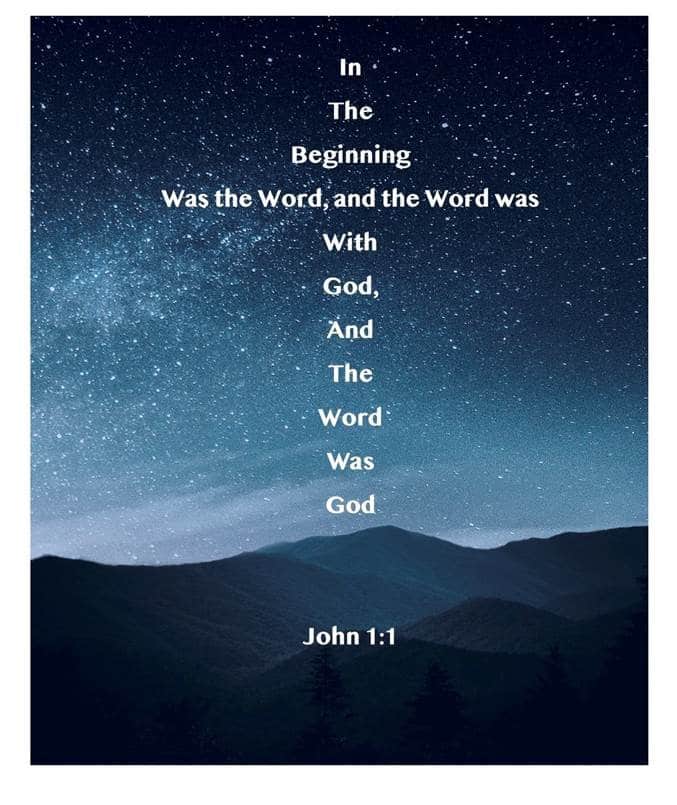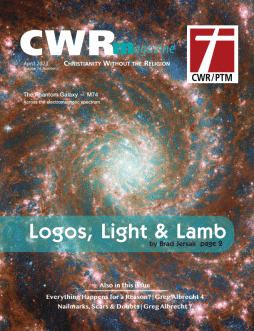The Word of God – Greg Albrecht

The first chapter of John is the New Testament counterpart of the Old Testament creation story recorded in the first chapter of Genesis. The Genesis story is focused on the physical and mortal beginning, with the creation story in the Gospel of John placing an emphasis on the spiritual and eternal beginning (the phrase “in the beginning” used twice in these two verses).
John introduces us to Jesus, God in the flesh, the Word. The Word became flesh and made his dwelling among us – John 1:14. When God became man and wanted to tell us all about who God is, Jesus became one of us. As the Word of God, Jesus is the Master Communicator – when God speaks to us what emerges is not the Old English of the King James Version, but Jesus.
In a transcendent and eternal way, the Word comes out of and in fact, IS God’s heart – God, of course, is Father, Son and Holy Spirit. As one of us, dwelling with us, the second person of the triune God speaks love from the heart of Father God to humanity within humanity. The Word of God, Jesus, God incarnate, not only WAS but he IS and he ALWAYS WILL BE. What he said yesterday is the same today and will be the same tomorrow (Hebrews 13:8).
The GOOD NEWS is that Jesus, the eternal Word of God, lives within the hearts and souls of Christ-followers, in such a way that our words might come from him, and thus our words can be filled with love, peace and joy.
Within humanity, words come out of either a human heart of corruptible flesh or out of a healed and spiritually transformed heart. Words come out of the life lived within, and they are powerful – they can inspire a friend, neighbor or family member or they can break their heart. Apart from God, words are often more destructive than they are instructive – more malicious than uplifting.
A good man brings good things out of the good stored up in his heart, and an evil man brings evil things out of the evil stored in his heart. For the mouth speaks what the heart is full of (Luke 6:45).
Our words are only as good as the life that lives within us. Unless Jesus, the Word, our risen Lord, the Light of the world, lives within us, we have nothing eternally pure and good to reflect and share with others. Words are the mirror of our hearts and souls. Words have power to help and heal or to hinder and harm.
As I reflected on Jesus, the Word of God, I recalled a quote from the late Frederick Buechner, who passed away this past August (in his book Peculiar Treasures), in which he writes about the special and unique emphasis provided in the Gospel of John compared with the other three Gospels (called the synoptics in that they share a common perspective in their accounts):
The Gospel of John is as different from the other three as night from day. Matthew quotes Scripture, Mark lists miracles, Luke reels off parables, and each has his own special axe to grind too, but the one they all have in common was to say something about the thirty-odd years Jesus lived on this earth, the kinds of things he did and said and what he got for his pains and what the world got for his pains too. John, on the other hand, clearly has something else in mind…
John says nothing about when or where or how he [Jesus] was born. He says nothing about how the Baptist baptized him… nothing about how he told people to eat bread and drink wine in his memory once in a while, or how he sweated blood in the garden the night before they arrested him… Jesus doesn’t even tell a single parable in John. So what then, according to John, does Jesus do?
He speaks words… Even when he works his miracles, you feel he’s thinking less about the human needs of the people he’s working them for than about something else he’s got to say about who he is and what he’s there to get done. When he feeds a big, hungry crowd on hardly enough to fill a grocery bag, for instance, he says, “I am the bread of life. He who comes to me shall not hunger, and he who believes in me shall never thirst” (6:35). When he raises his old friend Lazarus from the dead, he says, “I am the resurrection and the life. He who believes in me, though he die, yet shall he live, and whoever lives and believes in me shall never die” (11:25-26).
The Word of God (through his words) cleanses and purifies us from our mortal and corruptible hearts of flesh (human hearts), giving us new hearts. The Word heals our hearts!
This is such a wonderful and beautiful reality when we consider the war of words that consumes and defines our world today. Words in our culture divide us. Words in this society drive us apart. Words in our fragile, broken world set us on edge and make us fearful and apprehensive.
But the GOOD NEWS is that Jesus is the Word of God. He is the healing Word – he is a healing balm and ointment. He mends, rather than tearing apart. He builds and heals rather than destroying. Jesus is love rather than hatred. Jesus does not accuse or shame us, rather he beckons us to follow him and yield to him that he may live his life within us. As we follow Jesus, our words can be powerful sources of encouragement and inspiration – words of life, coming from the Word who lives within us.










 Plain Truth Ministries | Box 300 | Pasadena, CA 91129-0300
Plain Truth Ministries | Box 300 | Pasadena, CA 91129-0300

